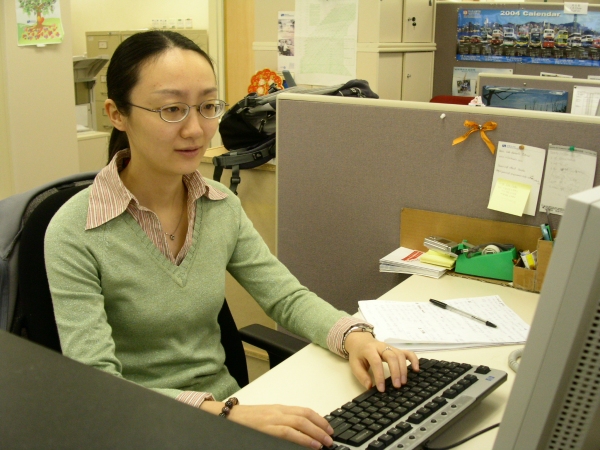Typhoon Committee Research Fellowship Scheme 2004
Typhoon Committee Research Fellowship Scheme 2004 (3 December 2004)
|
An expert from the Shanghai Typhoon Institute, Ms Wang Dongliang, began her two-month attachment at the Hong Kong Observatory in mid-October under the Asia-Pacific region Typhoon Committee Research Fellowship Scheme. During her attachment, Ms Wang participated in the research on tropical cyclone numerical weather prediction.
The objective of the Typhoon Committee Research Fellowship Scheme is to offer practising meteorologists the opportunity to visit other meteorological institutes within the Asia-Pacific region, build capacity and share experiences in tropical cyclone forecasting.
The theme of Ms Wang's study is "The Effects of Tropical Cyclone Bogus Data on Numerical Weather Prediction Models Analysis and Forecast". Owing to the scarcity of data over the oceans, "bogus tropical cyclone data" has been widely used over the years in weather prediction modelling. The technique is to utilise other supplementary information to make an indirect estimate of the three-dimensional distribution of various meteorological elements (such as air pressure, wind and moisture) around the centre of the tropical cyclone.
The derived parameters are input to the computer forecast models and used as initial conditions. With the substantial increase in remote sensing data in recent years, there comes a time when the merits and strategies of applying "bogus tropical cyclone data" in operational forecasts need to be critically reviewed. While in Hong Kong, Ms Wang aimed to develop more effective application strategies of "bogus tropical cyclone data" using the Observatory's numerical prediction models and various analysis schemes.
Reflecting on her attachment, Ms Wang said the opportunity of working at the Hong Kong Observatory was something not to be missed.
"The exchange of experience through the visit has been most invaluable. Through the study, I have gained a deeper insight into the application of 'bogus tropical cyclone data' in operation. I am most impressed by the professionalism and dedication of the Observatory staff and hope that my work would have a positive impact on tropical cyclone forecasts. I wish that this visit can enhance the bilateral development and collaboration of numerical prediction works."
The Observatory expects that the research will lead to a fuller understanding of the application of "bogus tropical cyclone data" and enhance the capability to forecast the future movements and intensity changes of tropical cyclones.
|
